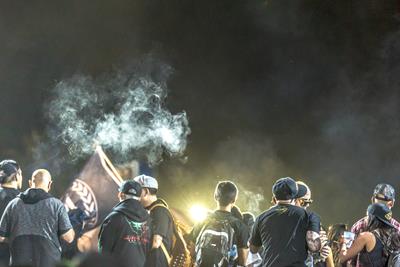
Monday October 2, 2017
By Andrew Ward
 News
News
Amongst all the marijuana legalization and election hubbub of 2016 was the passing of Denver’s Initiative 300, more commonly known as social consumption. The passing ushered in a four-year pilot program that intends to allow users to consume cannabis indoors and outdoors at licensed businesses in Denver. However, since its passing, Initiative 300 has turned into a headache for many establishments, neighborhoods and even some of its earliest supporters.
A new committee formed to draft the program's rules and regulations once it was passed. They included individuals from education and cannabis backgrounds, as well as community representatives. The group also included Yes on 300 policy advocate, Emmett Reistroffer.
Initiative 300 Social Use Overview
Several highly-contested sticking points arose between 300's proponents and those in the opposition. The major point of concern was the allowance of social consumption in establishments that sell liquor. Supporters believe it should be included to reflect what the voting public had chosen in the election.
Some of the other contested rules included the requirement to have patrons sign waivers upon entrance, which was not adopted into regulations; businesses must post signs much like bars about responsible consumption; and designated consumption zones.
Deliberations took nine months before the city finally began accepting applications in late August of this year. Additional laws state that:
- Businesses can be open from 7 a.m. to 2 a.m.
- Customers must be 21 or older to get in
- Surface-level outdoor smoking can't be visible from public places.
- No consuming marijuana within 500 feet of a residential zone, and 1,000 feet from schools, daycares, churches or treatment centers.
Now that social consumption is in motion, supporters are awaiting the outcome of early implementation. Voting results showed that the measure was heavily preferred in the urban parts of the city. Meanwhile, much of the suburbs opted for the status quo. This leads many in the opposition to believe this could be a passing trend.
Rachel O’Bryan, Campaign Manager for the group Protect Denver’s Atmosphere, said that “Back in 2012, marijuana legalization passed with a strong majority in Denver. Four years later, Initiative 300 has passed by a much slimmer margin. It appears that many Denver voters who originally supported marijuana legalization do not want to see marijuana consumption everywhere in Denver."

Meanwhile, the long and drawn out deliberations surrounding implementation now leaves it unclear about any future amendments or future laws. If the rollout and the subsequent program doesn’t succeed, this could be the last attempt made for some time.
Minimal Business Interest
Strict regulations leave many businesses less than enthused about social consumption in Denver. Many establishments are immediately disqualified from applying for either selling alcohol or being too close to other designated establishments. Bars, art galleries and even concert halls are out of the equation, despite these being the ideal locations that 300’s proponents had envisioned.
Tim Morgen, community relations rep for Denver’s BGood, told BuzzFeed that this was a no-win situation for the industry as a whole and wasn't worth the fight. "This is what I would expect out of Jeff Sessions’ office if he had to come up with a permitting program for social cannabis.”
No application data has been released so far and social consumption proponents do not expect many to apply under the current rules. This could result in the stalled implementation of other city’s efforts. However, there is at least one interested business vying to be the first to market.
Denver Vape and Play, although still in its infancy stage, hopes to open its doors to cannabis enthusiasts by winter 2018.
Las Vegas awaits Denver’s outcome before exploring a similar path toward social marijuana use. Although, if Denver does struggle with its rollout, Las Vegas could potentially find a better solution that appeases both cannabis supporters and the communities they occupy.
Potential Legal Implications
Unlike the state’s recreational sales rollout, this could become a botched effort for Denver. The topic has become such a sore issue that two of the measure’s creators are now considering suing the state.
The aforementioned Reistroffer and Kayvan Khaltabari drafted the initiative and contend to the city's zoning requirement most of all. The two informed Denver officials in August that unless restrictions were revised a lawsuit would be likely.
Back in June, Reistroffer explained his worries that soon proved correct. “I think we’re making history, but I think we also still have an uphill battle to really achieve that policy," Reistroffer said. "There are a lot of rules being proposed that concern me because they remove a vast majority of businesses from being able to participate.”
It’s too early to determine how the rollout will fare. While proponents of social consumption contend that the regulations fail to live up to the measure’s intention, not all seem concerned.
The actual issue at hand is the disconnect between proponents and opponents. The ugliness of the nine months that led to the rollout revealed a gap between both sides. Without a resolution between these two, no progress can be made. In past expansions of its program, Colorado and its capital have served as examples for what to do right. In this case, only time will tell where this program ends up. One this is for sure, the road to getting here was far rockier than anyone expected.
What are your thoughts on social marijuana consumption? Comment below!
Photo Credit: Cannabis Reports (license)







